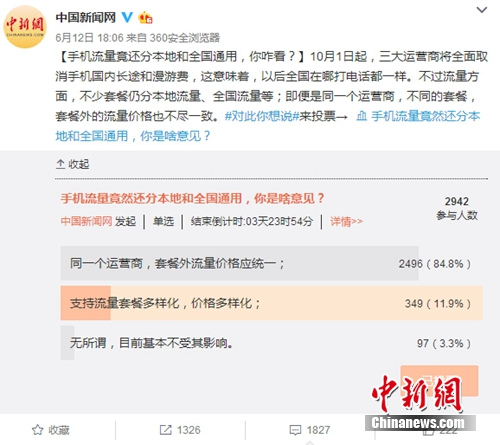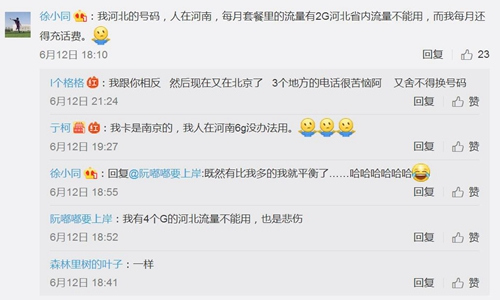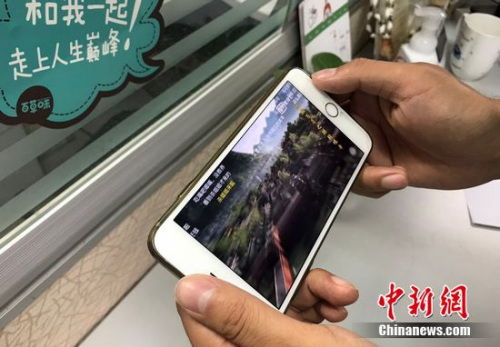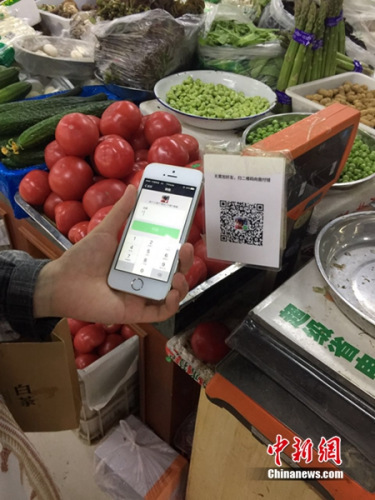Mobile phone long-distance roaming charges will cancel the traffic. Why is it still divided into local and national use?
BEIJING, Beijing, June 16 (Wu Tao) "Last month, there was a surplus of traffic in the package, and I went to other places, and the bill generated a traffic fee outside the package." I believe many people have encountered this situation and blamed it on traffic roaming charges.
However, is there any roaming of traffic? Why should telecom operators distinguish between local traffic and national general traffic? Why is the unit price of traffic different after the usage of some packages is exceeded? Zhongxin. com (WeChat WeChat official account: cns2012) combed and investigated this.

Recently, China News Network Weibo launched a report on "Mobile phone traffic is actually divided into local traffic and national use. What do you think?" A small survey.
Status: Distinguish between local traffic and national general traffic.
From October 1 this year, the three major operators will completely cancel the domestic long-distance and roaming charges of mobile phones, which means that the charges for calling anywhere in China and the whole country will be the same in the future, and no longer distinguish between local and foreign long-distance calls. However, in terms of traffic, many packages still distinguish between local traffic and national general traffic.
"The local traffic is inexhaustible, and the national traffic is not enough." Recently, many netizens reported to Zhongxin.com that they encountered this situation when using mobile phone traffic. Ms. Zhang, a user of Beijing Mobile, told Zhongxin.com that she went to Dalian for a few days this month. Although there was a lot of traffic in the mobile phone package, it was mostly local traffic in Beijing, so after going to Dalian, she could only use the traffic tightly and didn’t dare to take photos.
There are many other examples. In a survey on local traffic and national general traffic recently launched by Zhongxin. com, Weibo netizen @ Xu Xiaotong said: My Hebei number is in Henan, and the monthly traffic in the package is 2GB. The traffic in Hebei Province cannot be used, and I have to charge the phone bill every month.

Why should it be divided into local traffic and national general traffic?
With the acceleration of population flow, it is difficult for many people to wait for a long time in a region, and it is very troublesome to change their mobile phone numbers because many online accounts are bound. In this case, why do the three major operators have to distinguish between local traffic and national general traffic? Zhongxin. com contacted relevant persons of the three major operators.
China Unicom explained that China Unicom Group has launched a national general traffic package, and local companies will launch some local traffic packages according to local characteristics, mainly for people who don’t travel frequently.
China Telecom said that in order to meet the differentiated needs of users, China Telecom has provided diversified traffic products differentiated by region, time, content and terminal type, as well as various preferential forms such as promotional gifts, providing users with more choices.
A staff member with knowledge of China Mobile said that the network resources in different places are not balanced, and the traffic consumption is also different. The provinces with low traffic consumption may give the surplus local traffic to consumers or sell it to consumers at low prices, which leads to local traffic and national general traffic.
Xiang Ligang, an expert in communication industry and chairman of Zhongguancun Information Consumption Alliance, said in an interview with Zhongxin. com that local traffic is actually a kind of preferential traffic, and the price is cheaper than that of the national traffic. But now the user’s idea is to use the national traffic and pay the price of local traffic.
"At present, this is basically impossible to achieve, but the future trend is that the traffic price will be continuously lowered, but it will take time." Xiang Ligang said.

The price of traffic outside the package is inconsistent. Why?
Zhongxin. com also found that even for the same telecom operator, different packages have different traffic charges beyond the package. For example, the national version of China Unicom’s 4G package will be charged according to 0.2 yuan /MB after the domestic traffic exceeds the package limit; However, for the premium version of China Unicom’s 4G package, the domestic traffic will be charged at 0.27 yuan /MB after exceeding the package limit.
The same is true for China Telecom. The price of out-of-package traffic is 0.0001 yuan/KB. Enjoy the 4G package, and the traffic beyond the package will be charged at the price of 0.3 yuan /MB. The price of out-of-package traffic of China Mobile is 0.29 yuan /MB, which is unified throughout the country. (Note: The three major operators all offer preferential measures for the off-package traffic, and will not introduce them one by one. )
China Unicom explained, "Because the local traffic package price is low, the price of traffic beyond the package will be relatively high." China Telecom said that the price inside and outside the package is the difference between preferential tariff and standard tariff, and the package is actually a preferential combination, which is also the common practice of telecom operators in the world.
Xiang Ligang believes that this is a marketing method, and there is a discount if you buy more and use more, which is used in many industries. "For example, for users who use 10GB of traffic every month and users who use 1GB of traffic every month, there is nothing wrong with setting different unit price standards for traffic beyond the package limit." Xiang Ligang said.
However, the above survey initiated by Zhongxin.com shows that as of 17: 00 on the 15th, 84.8% of netizens believe that the price of out-of-package traffic of the same operator should be the same; 11.9% of netizens support the diversification of telecom operators’ traffic packages and the diversification of prices.

The decline of traffic price is still the future trend.
In the interview, Zhongxin. com learned that more than one telecom operator denied that there was roaming in traffic. According to the above-mentioned China Mobile insider, there is no roaming charge for traffic, but only a distinction between local traffic and national general traffic, and the unified price of national traffic is the general trend, and the traffic price will be continuously lowered.
However, Xiang Ligang believes that the future traffic pricing trend may be the same as now, with certain differences to meet the needs of different users. "If the national traffic is at a price, it may be unfair to those users who use more traffic every month, because they can’t enjoy the preferential price of local traffic."
There are indications that the downward adjustment of traffic price is still the future trend. In March of this year, the three major operators announced the results since speeding up and reducing fees, involving mobile traffic. China Mobile said that from 2014 to 2016, the average unit price of China Mobile’s Internet access dropped by 63.5%. China Telecom said that in the past two years, the mobile phone traffic charges of China Telecom dropped by 57.4%. China Unicom said that the average traffic tariff level of China Unicom dropped to a new low in 2016, which was more than 48% lower than that at the end of 2015. (End)